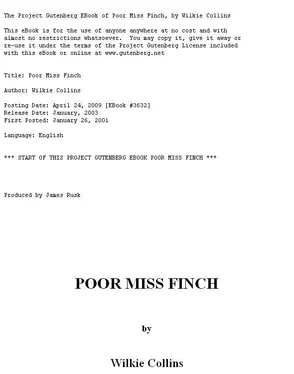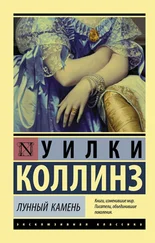Уилки Коллинз - Poor Miss Finch
Здесь есть возможность читать онлайн «Уилки Коллинз - Poor Miss Finch» весь текст электронной книги совершенно бесплатно (целиком полную версию без сокращений). В некоторых случаях можно слушать аудио, скачать через торрент в формате fb2 и присутствует краткое содержание. Год выпуска: 2002, Жанр: Классическая проза, на английском языке. Описание произведения, (предисловие) а так же отзывы посетителей доступны на портале библиотеки ЛибКат.
- Название:Poor Miss Finch
- Автор:
- Жанр:
- Год:2002
- ISBN:нет данных
- Рейтинг книги:3 / 5. Голосов: 1
-
Избранное:Добавить в избранное
- Отзывы:
-
Ваша оценка:
- 60
- 1
- 2
- 3
- 4
- 5
Poor Miss Finch: краткое содержание, описание и аннотация
Предлагаем к чтению аннотацию, описание, краткое содержание или предисловие (зависит от того, что написал сам автор книги «Poor Miss Finch»). Если вы не нашли необходимую информацию о книге — напишите в комментариях, мы постараемся отыскать её.
Poor Miss Finch — читать онлайн бесплатно полную книгу (весь текст) целиком
Ниже представлен текст книги, разбитый по страницам. Система сохранения места последней прочитанной страницы, позволяет с удобством читать онлайн бесплатно книгу «Poor Miss Finch», без необходимости каждый раз заново искать на чём Вы остановились. Поставьте закладку, и сможете в любой момент перейти на страницу, на которой закончили чтение.
Интервал:
Закладка:
I felt every nerve in my body shudder at the sight of the child.
The poor little thing was white and wild with terror. She was incapable of uttering a word. When I knelt down to fondle and soothe her, she caught convulsively at my hand, and attempted to raise me. I got on my feet again. She repeated her dumb cry more loudly—and tried to drag me out of the house. She was so weak that she staggered under the effort. I took her up in my arms. One of my hands, as I embraced her, touched the top of her frock, just below the back of her neck. I felt something on my fingers. I looked at them. Gracious God! I was stained with blood!
I turned the child round. My own blood froze. Her mother, standing behind me, screamed with horror.
The dear little thing's white frock was spotted and splashed with wet blood. Not her own blood. There was not a scratch on her. I looked closer at the horrid marks. They had been drawn purposely on her—drawn, as it seemed, with a finger. I took her out into the light. It was writing! A word had been feebly traced on the back of her frock. I made out something like the letter "H." Then a letter which it was impossible to read.
Then another next to it, which might have been "L," or might have been "J." Then a last letter, which I guessed to be "P."
Was the word—"Help"?
Yes!—traced on the back of the child's frock, with a finger dipped in blood—"HELP."
CHAPTER THE FOURTEENTH
Discoveries at Browndown
IT is needless to tell you at what conclusion I arrived, as soon as I was sufficiently myself to think at all.
Thanks to my adventurous past life, I have got the habit of deciding quickly in serious emergencies of all sorts. In the present emergency—as I saw it—there were two things to be done. One, to go instantly with help to Browndown: the other, to keep the knowledge of what had happened from Lucilla until I could get back again, and prepare her for the discovery.
I looked at Mrs. Finch. She had dropped helplessly into a chair. "Rouse yourself!" I said—and shook her. It was no time for sympathizing with swoons and hysterics. The child was still in my arms; fast yielding, poor little thing, to the exhaustion of fatigue and terror. I could do nothing until I had relieved myself of the charge of her. Mrs. Finch looked up at me, trembling and sobbing. I put the child in her lap. Jicks feebly resisted being parted from me; but soon gave up, and dropped her weary little head on her mother's bosom. "Can you take off her frock?" I asked, with another shake—a good one, this time. The prospect of a domestic occupation (of any sort) appeared to rouse Mrs. Finch. She looked at the baby, in its cradle in one corner of the room, and at the novel, reposing on a chair in another corner of the room. The presence of these two familiar objects appeared to encourage her. She shivered, she swallowed a sob, she recovered her breath, she began to undo the frock.
"Put it away carefully," I said; "and say nothing to anybody of what has happened, until I come back. You can see for yourself that the child is not hurt. Soothe her, and wait here. Is Mr. Finch in the study?"
Mrs. Finch swallowed another sob, and said, "Yes." The child made a last effort. "Jicks will go with you," said the indomitable little Arab faintly. I ran out of the room, and left the three babies—big, little, and least—together.
After knocking at the study door without getting any reply, I opened it and went in. Reverend Finch, comfortably prostrate in a large arm-chair (with his sermon-paper spread out in fair white sheets by his side), started up, and confronted me in the character of a clergyman that moment awakened from a sound sleep.
The rector of Dimchurch instantly recovered his dignity.
"I beg your pardon, Madame Pratolungo, I was deep in thought. Please state your business briefly." Saying those words, he waved his hand magnificently over his empty sheets of paper, and added in his deepest bass: "Sermon-day."
I told him in the plainest words what I had seen on his child's frock, and what I feared had happened at Browndown. He turned deadly pale. If I ever yet set my two eyes on a man thoroughly frightened, Reverend Finch was that man.
"Do you anticipate danger?" he inquired. "Is it your opinion that criminal persons are in, or near, the house?"
"It is my opinion that there is not a moment to be lost," I answered. "We must go to Browndown; and we must get what help we can on the way."
I opened the door, and waited for him to come out with me. Mr. Finch (still apparently pre-occupied with the question of the criminal persons) looked as if he wished himself a hundred miles from his own rectory at that particular moment. But he was the master of the house; he was the principal man in the place—he had no other alternative, as matters now stood, than to take his hat and go.
We went out together into the village. My reverend companion was silent for the first time in my limited experience of him. We inquired for the one policeman who patrolled the district. He was away on his rounds. We asked if anybody had seen the doctor. No: it was not the doctor's day for visiting Dimchurch. I had heard the landlord of the Gross Hands described as a capable and respectable man; and I suggested stopping at the inn, and taking him with us. Mr. Finch instantly brightened at that proposal. His sense of his own importance rose again, like the mercury in a thermometer when you put it into a warm bath.
"Exactly what I was about to suggest," he said. "Gootheridge of the Gross Hands is a very worthy person—for his station in life. Let us have Gootheridge, by all means. Don't be alarmed, Madame Pratolungo. We are all in the hands of Providence. It is most fortunate for you that I was at home. What would you have done without me? Now don't, pray don't, be alarmed. In case of criminal persons—I have my stick, as you see. I am not tall; but I possess immense physical strength. I am, so to speak, all muscle. Feel!"
He held out one of his wizen little arms. It was about half the size of my arm. If I had not been far too anxious to think of playing tricks, I should certainly have declared that it was needless, with such a tower of strength by my side, to disturb the landlord. I dare not assert that Mr. Finch actually detected the turn my thoughts were taking—I can only declare that he did certainly shout for Gootheridge in a violent hurry, the moment we were in sight of the inn.
The landlord came out; and, hearing what our errand was, instantly consented to join us.
"Take your gun," said Mr. Finch.
Gootheridge took his gun. We hastened on to the house.
"Were Mrs. Gootheridge or your daughter at Browndown today?" I asked.
"Yes, ma'am—they were both at Browndown. They finished up their work as usual—and left the house more than an hour since."
"Did anything out of the common happen while they were there?"
"Nothing that I heard of, ma'am."
I considered with myself for a minute, and ventured on putting a few more questions to Mr. Gootheridge.
"Have any strangers been seen here this evening?" I inquired.
"Yes, ma'am. Nearly an hour ago two strangers drove by my house in a chaise."
"In what direction?"
"Coming from Brighton way, and going towards Browndown."
"Did you notice the men?"
"Not particularly, ma'am. I was busy at the time."
A sickening suspicion that the two strangers in the chaise might be the two men whom I had seen lurking under the wall, forced its way into my mind. I said no more until we reached the house.
All was quiet. The one sign of anything unusual was in the plain traces of the passage of wheels over the turf in front of Browndown. The landlord was the first to see them. "The chaise must have stopped at the house, sir," he said, addressing himself to the rector.
Читать дальшеИнтервал:
Закладка:
Похожие книги на «Poor Miss Finch»
Представляем Вашему вниманию похожие книги на «Poor Miss Finch» списком для выбора. Мы отобрали схожую по названию и смыслу литературу в надежде предоставить читателям больше вариантов отыскать новые, интересные, ещё непрочитанные произведения.
Обсуждение, отзывы о книге «Poor Miss Finch» и просто собственные мнения читателей. Оставьте ваши комментарии, напишите, что Вы думаете о произведении, его смысле или главных героях. Укажите что конкретно понравилось, а что нет, и почему Вы так считаете.






